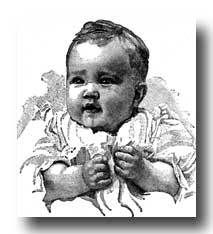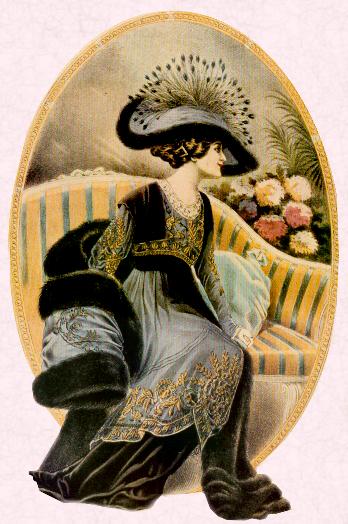Some of you have sent me correspondence expressing interest in Orpha, the wretched servant girl, and wishing to know more about her bio-graphy and plight. Well, I can’t imagine a more dreadful subject, but if you insist on obtaining this knowledge I suppose I don’t see how harm can come of it.
The year was 1891. I was fresh out of my hand-woven christening gown, mother had contracted another bout of cholera, and Papá was recuperating from a head wound inflicted by the striking brutes at his jute mill (inflicted by a son of immigrants from Dublin, who was justly hanged for his crime). To make matters worse, my nurse-maid had recently perished in a fire at her tenement, and mother had to fire the sullen cook for serving dried-out ptarmigan to the Mayor and his wife at a very important luncheon. Oh, what were they to do? Life was so trying with only eight servants. I am fortunate that I have no memory of this very turbulent era in my history.
Papá was able to promptly employ a new nurse-maid and cook. Many in our city were desperate for honest work ever since Papá had purchased and closed down the competing Collingswood-Smurfitt Cotton factory. But an unexpected visitor was thrust upon us: an infant, wan, malnourished (though not in the pleasing feminine way that I was wan and malnourished), plebeian. She was left on our marble stoa at the front of our estate in Maine, where the doctors had sent Mother to recuperate, and the children along with her. She was wrapped in a tattered calico that stank of offal; I shudder even now thinking of what a shock this must have been for Mother, who was already in a frail state. The child was not pleasant to the eye, and she let out a gruesome squall that reminded one more of a hyena’s caterwaul than a baby’s soft whimper. “I shall throw her back out in the snow!” remarked Ada, the head maid, holding her nose. But something in Mother’s heart would not let Ada carry out the task that reason dictated was suitable. Mother always had a softness for the plight of the poor; it was the one flaw in an otherwise great lady.
So in from the bitter cold came this horrid child. There was much discussion as to whether she should be placed in an indigent children’s home or fattened up to be put to work in Papá’s mill when she reached the lawful age of six. Eventually it was decided that she should be prepared to be an attendant for me, and she was given generous quarters in the basement behind the Armagnac cellar, where she was fed on rice porridge and corncobs. My elder sister Marguerite, all of seven at the time, thought it would be amusing to call her Orpha, which sounded like “orphan,” and the name stuck. Perhaps some day she will have advanced enough to attain a surname as well.
.....
Is that sketch of Orpha, you ask? Why of course not! 'Tis me. No such likeness exists of Orpha.

20.11.10
A brief account of Orpha's life
Posted by
Katharina van Seethinbottom
at
22:28
![]()
Labels: Convalescence, Interclass Strife, Servants, Urchins
Subscribe to:
Post Comments (Atom)


No comments:
Post a Comment